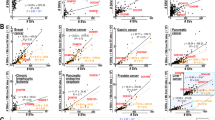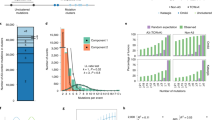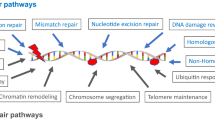Abstract
Polymorphisms in DNA repair genes, including double-strand break (DSB) repair genes, are postulated to confer increased cancer risk. A variant of the XRCC3 gene, which is involved in DSB repair, has been associated with increased risk of malignant skin melanoma and bladder cancer. We tested the hypothesis that this variant, Thr241Met, may affect cancer risk by disrupting a critical function of XRCC3, i.e., promoting homology-directed repair (HDR) of chromosomal DSBs. Using a quantitative fluorescence assay, we find that the variant XRCC3 protein is functionally active for HDR, complementing the HDR defects of an XRCC3 mutant cell line as well as the wild-type protein. We also examined cells expressing this variant for sensitivity to the interstrand cross-linking agent, mitomycin C (MMC), as HDR mutant cell lines, including the XRCC3 mutant, have been found to be hypersensitive to this DNA damaging agent. Cells expressing the variant protein were found to be no more sensitive than cells expressing the wild-type protein. These results suggest that the increased cancer risk associated with this variant may not be due to an intrinsic HDR defect.
This is a preview of subscription content, access via your institution
Access options
Subscribe to this journal
Receive 50 print issues and online access
$259.00 per year
only $5.18 per issue
Buy this article
- Purchase on Springer Link
- Instant access to full article PDF
Prices may be subject to local taxes which are calculated during checkout



Similar content being viewed by others
References
Bishop DK, Ear U, Bhattacharyya A, Calderone C, Beckett M, Weichselbaum RR, Shinohara A . 1998 J. Biol. Chem. 273: 21482–21488
Brenneman MA, Weiss AE, Nickloff JA, Chen DJ . 2000 Mutat. Res. 459: 89–97
Butkiewicz D, Rusin M, Enewold L, Shields PG, Chorazy M, Harris CC . 2001 Carcinogenesis 22: 593–597
Cui X, Brenneman M, Meyne J, Oshimura M, Goodwin EH, Chen DJ . 1999 Mutat. Res. 434: 75–88
David-Beabes GL, Lunn RM, London SJ . 2001 Cancer Epidemiol. Biomarkers Prev. 10: 911–912
Griffin CS, Simpson PJ, Wilson CR, Thacker J . 2000 Nat. Cell Biol. 2: 757–761
Kurumizaka H, Ikawa S, Nakada M, Eda K, Kagawa W, Takata M, Takeda S, Yokoyama S, Shibata T . 2001 Proc. Natl. Acad. Sci. USA 98: 5538–5543
Liu N, Lamerdin JE, Tebbs RS, Schild D, Tucker JD, Shen MR, Brookman KW, Siciliano MJ, Walter CA, Fan W, Narayana LS, Zhou ZQ, Adamson AW, Sorensen KJ, Chen DJ, Jones NJ, Thompson LH . 1998 Mol. Cell 1: 783–793
Masson JY, Stasiak AZ, Stasiak A, Benson FE, West SC . 2001 Proc. Natl. Acad. Sci. USA 98: 8440–8446
Matullo G, Guarrera S, Carturan S, Peluso M, Malaveille C, Davico L, Piazza A, Vineis P . 2001 Int. J. Cancer 92: 562–567
Miyazaki J, Takaki S, Araki K, Tashiro F, Tominaga A, Takatsu K, Yamamura K . 1989 Gene 79: 269–277
Moynahan ME, Cui TY, Jasin M . 2001 Cancer Res. 61: 4842–4850
Pierce AJ, Hu P, Han M, Ellis N, Jasin M . 2001a Genes Dev. 15: 3237–3242
Pierce AJ, Johnson RD, Thompson LH, Jasin M . 1999 Genes Dev. 13: 2633–2638
Pierce AJ, Stark JM, Araujo FD, Moynahan ME, Berwick M, Jasin M . 2001b Trends Cell Biol. 11: S52–S59
Schild D, Lio Y, Collins DW, Tsomondo T, Chen DJ . 2000 J. Biol. Chem. 275: 16443–16449
Shen MR, Jones IM, Mohrenweiser H . 1998 Cancer Res. 58: 604–608
Tebbs RS, Zhao Y, Tucker JD, Scheerer JB, Siciliano MJ, Hwang M, Liu N, Legerski RJ, Thompson LH . 1995 Proc. Natl. Acad. Sci. USA 92: 6354–6358
Vogelstein B, Kinzler KW . 1998 The Genetic Basis of Human Cancer New York: McGraw-Hill
Winsey SL, Haldar NA, Marsh HP, Bunce M, Marshall SE, Harris AL, Wojnarowska F, Welsh KI . 2000 Cancer Res. 60: 5612–5616
Acknowledgements
We thank Marianne Berwick and Adam Olshen (MSKCC) for their assistance. This work was funded by NIH grant GM54688 to M Jasin.
Author information
Authors and Affiliations
Corresponding author
Rights and permissions
About this article
Cite this article
Araujo, F., Pierce, A., Stark, J. et al. Variant XRCC3 implicated in cancer is functional in homology-directed repair of double-strand breaks. Oncogene 21, 4176–4180 (2002). https://doi.org/10.1038/sj.onc.1205539
Received:
Revised:
Accepted:
Published:
Issue Date:
DOI: https://doi.org/10.1038/sj.onc.1205539
Keywords
This article is cited by
-
Genotoxic evaluation of occupational exposure to antineoplastic drugs
Toxicological Research (2020)
-
Association between x-ray repair cross-complementing group 3 (XRCC3) genetic polymorphisms and papillary thyroid cancer susceptibility in a Chinese Han population
Tumor Biology (2016)
-
DNA damage accumulation and repair defects in acute myeloid leukemia: implications for pathogenesis, disease progression, and chemotherapy resistance
Chromosoma (2014)
-
No significant association between the XRCC3 Thr241Met polymorphism and lung cancer risk: a meta-analysis
Tumor Biology (2013)
-
Variants in DNA double-strand break repair genes and risk of familial breast cancer in a South American population
Breast Cancer Research and Treatment (2010)



